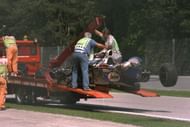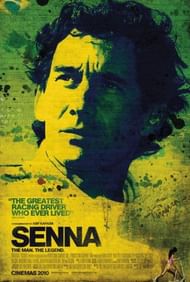How does one define greatness in sport? Is it the attainment of trophies or accolades or is it the manner in which those aims are achieved?
When one talks about greatness in a sport then the name Ayrton Senna is synonymous with it.
Senna was arguably one of the greatest drivers to have ever graced a Formula One track. He was the complete champion, a driver of unbelievable magnificence. For F1 fans, and in particular Brazilians, the Formula One car was his drive to immortality.
The documentary ‘Senna’ directed by Asif Kapadia is undoubtedly one of the best sports documentaries, if not one of the best overall documentaries, to have been made. Its IMDB rating of 8.5 and ranking speaks volumes about how good the film is.
In it the director chronicles the rise of one of Brazil’s most beloved sons and his attainment of perfection. Right from the simple yet competitive world of karting to the glitz and glamour of Formula One, Senna never changed his philosophies. His one ambition was to excel at racing and that is what he stuck by till his tragic death.
Through the use of a lot of footage (both professional as well as Senna’s personal family ones) the director has weaved a marvellous story about the man behind the legend.
It was quite evident from the start of his F1 career that the world was witnessing a legend in the making. The footage showcases his performance in the rain at the Monaco Grand Prix in one of his early races, which is testament to his almost supernatural skill of driving in the rain. While other drivers struggled in such adverse conditions, Senna often excelled in rainy conditions and some of his most memorable performances were in wet conditions.
It is also obvious how aggressive a driver he was. To him speed was the ultimate drug and he never went half hearted into any corner or chicane. He would attack corners with almost a predator like quality. It was this will and desire to win that set him apart from others. Some of the footage that shows his early rise to the top is absolutely sensational. Interspersed among the footage is commentary from F1 experts and his own family (in particular his sister), which links up beautifully.

McLaren Honda driver Alain Prost of France celebrates his victory with teammate Ayrton Senna of Brazil who finished second after the 1989 Australian Formula One Grand Prix held in Adelaide, Australia. (Getty Images)
The documentary also covers his epic rivalry with Alain Prost, when they were teammates at McLaren. The film beautifully show cases the body language of the two drivers while they were competing for the title, right from the friendliness at first to the outright hostility between the two. It shows that behind the crocodile smiles there were the stirrings of a bitter rivalry that would captivate the world and put F1 in the limelight.
The incident at the 1989 Japanese Grand Prix is beautifully dissected, with a combination of footage of the race as well as the aftermath and commentary from former F1 commentators and Ron Dennis, then team principal of McLaren. The film is also instrumental in showing how political F1 was at the time and hints that the French connection in the top brass of the FISA was instrumental in Prost winning his 3rd championship.
The Prost-Senna rivalry did so much good for F1 that it is hard to describe. The rivalry was akin to the Manchester United-Arsenal rivalry in the 90’s and early 2000’s that propelled the English Premier League to a global audience.
A god-fearing devout Catholic, we often get to see the softer and less competitive side of Senna in the film. His love for his country Brazil is unparalleled. He would see the pain and suffering of his countrymen and would try and do his best to bring happiness in their lives. Every time he won he brought smiles and celebrations across the country. His sheer tenacity to win the Brazilian GP despite a gear box failure that left him stuck in sixth gear is testament to his mastery of the art of driving. His emotional response following the race was there for all to see as well.
A philanthropist, Senna was concerned about the welfare of the children of Brazil. An organisation set up in his name following his all too early demise has gone on to educate 12 million less fortunate Brazilian children. The humility of the man is well documented in the film too. And for added effect, we get to see snippets of his personal life, and the women he dated.
During his last season with McLaren he would go on to claim many memorable wins. But despite his supreme effort he fell short to the power of the Williams cars that were technologically aided. His eventual move to Williams brought him hope of a fourth world title but the subsequent ban on the very same technological aids that had helped Williams dominate would hamper this dream.
In the absence of the aids what Senna inherited was not the supreme machine that had helped Prost win a 4th world title, but a shadow of that car which became inherently unstable. Despite this handicap Senna pushed on and still went on to claim pole positions in subsequent races only to fall short during them. This led to a great amount of frustration for Senna, who never could settle for second best.
All this led to the fateful San Marino Grand Prix of 1994. By far one of the most pivotal races in F1 history, it led to widespread changes in the sport in terms of safety. The film showed the emotions that Senna was going through during the entire event with a sort of stark clarity that one rarely sees. Right from his concern when his young compatriot Rubens Barrichello suffers a horrific crash to the subsequent crash resulting in Ronald Ratzenberger’s death in qualifying, everything is well chronicled.

Ayrton Senna’s Williams Renault is hauled off the circuit after he crashed during the 1994 San Marino Grand Prix at the Imola circuit. Senna suffered a fatal accident when the steering column sheared leaving the Brazilian helpless as his car speared into the concrete wall at the Tamburello corner. (Getty Images)
On race day itself one can see the tension writ large on Senna’s face. Additional commentary from F1’s chief doctor at the time (Sid Watkins) informs the viewers about how he tried to convince Senna to give up racing and Senna’s subsequent response that he just couldn’t bring himself to do it. The fatal crash he suffered at the Tamburello corner and the efforts to revive him and the failure to do so is extremely emotional. It is hard not to shed a tear when footage is shown of the mourning of millions of Brazilians when they hear of his death.
By the end of the film you are left emotionally drained by the loss of one who was so passionate about life and racing. For Senna speed was in his blood, he was born to race, born to be a world champion. For F1 fans like myself, who grew up on a diet of Michael Schumacher and his all conquering days at Ferrari, this film shows the true champion of Formula One racing.
Senna could never play politics, could never manipulate people to do as he wished, he could only drive and a master he was at it. This film is by far a must watch for any F1 fan and non F1 fans as well. The footage is superb and the pace of the film is extremely engaging. It captivates the viewer and leaves him/her wanting more by the end of it.
If you haven’t watched it yet, you surely are missing out on one of the classics.

